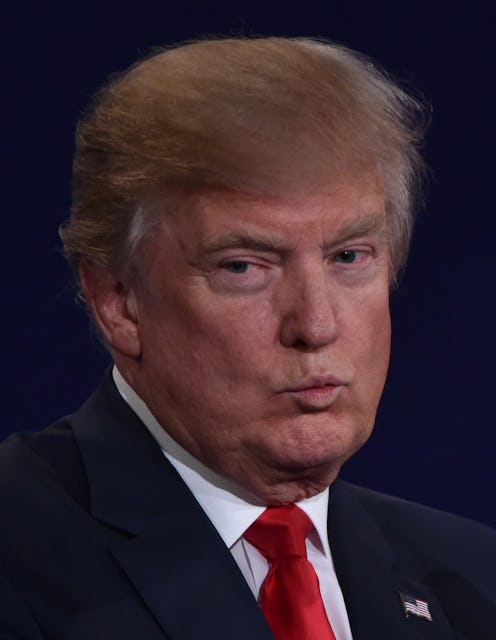News
Trump Knows He's Going To Lose, And He's Prepping
At the third and final presidential debate on Wednesday night, Donald Trump revealed he has plans for what he will do when he learns the results of the election on Nov. 8: Rather than accepting the results peacefully, presuming he may lose, Trump told moderator Chris Wallace that he "will look at it at the time." The candidate's refusal is shocking on multiple levels. Primarily, his statement suggests a complete disregard for the centuries-old process of democratic elections and presidential appointments. However, it also provides an early look at a potential future — a response anticipating loss, coming from a candidate whose platform has rested on his own conviction of his personal superiority over his opponent. To state it simply, why is Donald Trump preparing for defeat?
During Wednesday night's debate, Trump described several plans for his anticipated presidency, including the appointment of "conservative" Supreme Court Judges and the construction of a wall along the southern U.S. border with Mexico to keep out potential immigrants. Despite his rhetoric of victory, Trump's stark refusal to state his reliance on the democratic process indicates that he may be anticipating a loss. And he should be anticipating a loss — maybe Trump is actually watching his dismal poll numbers, despite the fact that he is on the campaign trail proclaiming certain victory. Claiming the election is rigged allows Trump to disavow potential failure.
Trump would not be alone in this belief, if he is indeed anticipating his own defeat. While he officially endorses the Republican nominee, House Speaker Paul Ryan may expect a Hillary Clinton presidency and has condemned Trump's offensive words and actions for months.
Trump does not hold back from verbal retaliation against those who oppose him or denounce his conduct. After Ryan condemned Trump's taped boasts of sexual assault, the candidate slammed him on Twitter:
Clinton responded to her opponent's claims of a rigged election, calling Trump's comments "horrifying" and an example of "talking down our democracy." Even Lindsay Graham called Trump out on Twitter:
While Clinton's denunciation speaks to concerns of the respect and preservation of the American democratic system, she may want to consider the subtler implications of Trump's insistence on keeping the country "in suspense." With these words, Trump's message is not one of confidence in a win, but of preparation to fabricate self-defenses and conspiracy theories upon failure. Clinton may be picking up on these nuances, which Trump himself may not even be aware of: her campaign strategy of late has been relatively calm, allowing her opponent to "dig himself deeper and deeper into a hole," as Democratic strategist Lis Smith told The Guardian.
Polls show the likelihood of a Clinton win is significant. But even if Trump realizes the magnitude of this possibility, why would he suggest that his self-confidence in his own eventual success could be sagging? What purpose does Trump's self-defeatism serve? One answer may lie in the Trump fanbase: as he prepares to face a likely loss, he may be seeking ways to maintain and bolster the enthusiasm of his voters. However, any strategy remains to be seen behind the way Trump derides the democratic process of voting. Why any nominee for president would claim the entire process is corrupt before Voting Day is a mystery — looks like Donald is keeping us in suspense.
